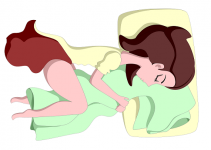
You wake up and get out of bed to start your day. You swing your feet onto the ground and stand up, only to realize an aching tension pulling at your knee. You figure it’s just stiffness, but as you continue your day you notice the subtle pulsating of pain radiating across your knees.
Knee pain can be connected to a variety of different health problems. Muscle and joint aches are typically related to injuries sustained during exercise or joint-impacting conditions such as arthritis. But there may be a completely logical explanation for your knee pain that is just as likely: your period.
Why?
Your aching knees may in fact be a result of your menstrual cycle. A woman’s period affects her body in many ways at different points throughout the regular cycle. And your knees are no exception. At different times during your cycle, the muscles in your knees react differently. The fluctuating function in your knee muscles then destabilizes the joints, making for some serious achiness.
Progesterone and estrogen are both common hormones that affect your body during your period cycle. These hormones also affect how the nervous system works, which can affect your muscles and joints. Ovulation can also play a factor. When the ovary releases its egg, they body’s reactions might manifest in pain. The prostaglandin, a hormone-like chemicals, released at the time of ovulation, can cause inflammation and joint aches.
Another reason for the increase in knee pain due to menstruation is simply the fact that women are more susceptible to pain than men. It is thought that endorphins work more effectively in men than in women. As a result, the changes in hormones may make the achiness in your knees more palpable.
Premenstrual tension is a common symptom of premenstrual syndrome caused by the imbalance of the progesterone and estrogen hormone levels in the body. Women who experience this symptom can have pain manifest in a variety of areas on the body, including knee joint and muscle pain. Most of the time, these symptoms let up with the onset of your periods, although they may resurface during the later phase of the cycle.
A research study conducted at the University of North Carolina-Chapel Hill measured the link between women’s menstrual cycles and the activity of their knee muscles. They found the firing rate of the muscle fibers in women to be significantly higher later in their menstrual cycle and right before their cycles.
Increasing joint pains are also common during perimenopause and menopausal phases due to the significant drop in estrogen levels.
While the link between muscle pain and specific phases of the menstrual cycle is still being studied, there is no denying that our menstrual cycles affect our muscles and can cause our knees to ache. There are several factors that can contribute to knee pain during your menstrual cycle, and symptoms can be worsened by PMS, stress, hormone changes, emotional problems, and chemical changes in the brain. All of these factors combined with each individual woman’s cycle and how they react to it can determine the severity of their knee pain.
What to do if your knees ache?
Muscle and joint pain is a common period-related symptom that women experience, just like cramps, bloating, and back pain. Just like these other symptoms, there are ways to mitigate the pain and treat your knee discomfort.
Vitamin D: Your aching joints and muscles could be an indication that you have a vitamin D deficiency. Integrating a higher intake of vitamin D into your daily diet can possibly help reduce that muscle pain around your time of the month.
Magnesium: It is also thought that low magnesium levels can cause aching joints and muscles as a result of inflammation. Eating your greens, taking magnesium supplements, and spreading magnesium gel onto your joints can help ease the pain.
Ibuprofen: If you’re feeling a little achier than usual during your period, try taking some ibuprofen. The pain-relieving medication can help reduce inflammation and provide some relief, also helping with other period symptoms such as cramps and headaches.
Massaging and heating pads are also helpful.
Overall, a combination of good nutrition and dietary supplements can help reduce your knee pain symptoms. Some non-organic dairy products may interact and disrupt your natural hormone cycle, contributing to hormonal imbalances. Eating a more organic diet can help reduce the severity of the symptoms during your menstrual cycle, and making it less painful to walk.
There are some hypotheses that women have more complaints of knee pain because of wider pelvis, but that has yet to be proven by appropriate research.




Sound like you need a visit to your ob gynecologist. And get a pelvic ultrasound to be sure everything went well with the abortion.
Hi, I had an incomplete surgical abortion 5 months ago. Four days after the incomplete surgery, I was admitted to the hospital to undergo the D C procedure, which also prolonged my recovery time. My first cycle after was terrible, contacted my doctor, stated it was normal. Five months later I’m having the same problem, it’s actually worse compared to the bleeding. When I describe my pain it literally feels like the surgical abortion all over again every month. Not only that, my cramps always started a week before my cycle, but now my cycle lasts a week as well, it always lasted for three days. I’m worried because the pain is so bad that it’s disabling me from my daily activities, including work. I’m only 22, can someone help me, that have or had this similar problem? Thanks!